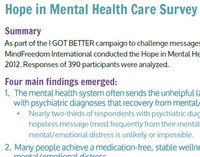Well over 1,000 individuals – many of them MindFreedom members and supporters – participated in this important survey gathering information on messages of hopelessness in mental health care. Download the results now.
Click here to download the final survey summary.
The Hope in Mental Health Care Survey was administered by MindFreedom International from June to October of 2012. A part of the I GOT BETTER campaign, the survey was designed to gather information on these three important questions:
1. How prevalent are messages of hopelessness in mental health care?
2. What are the sources and contents of these messages?
3. What is the veracity of these messages? In other words, do hopeless prognoses and statements about recovery, medication use, etc. generally prove true or false?
Thanks to everyone who shared their wisdom and experience by taking part in this important survey!
Main Findings
Here were the four main findings that emerged from our analysis of the responses of psychiatric survivors to the second part of the survey (n=390):
1. The mental health system often sends the unhelpful (and hopeless) message to individuals with psychiatric diagnoses that recovery from mental/emotional distress is impossible.
- Nearly two-thirds of respondents with psychiatric diagnoses have received the unhelpful and hopeless message (most frequently from their mental health provider) that recovery from mental/emotional distress is unlikely or impossible.
2. Many people achieve a medication-free, stable wellness even after experiencing extreme mental/emotional distress.
- Nearly 70 percent of people who experienced extreme mental/emotional distress (receiving diagnoses of psychosis or schizophrenia) rated themselves as “recovered” or “fully recovered.”
- Over half of individuals who have received diagnoses of psychosis or schizophrenia are currently medication free. Nearly half of the latter group have been medication free for more than five
years.
3. Respondents overwhelmingly judged a variety of non-drug alternatives to be more helpful to individuals in mental/emotional distress than standard psychiatric care.
4. Certain psychiatric practices, particularly forced drugging, are often described as “traumatizing.”
To learn more, download the final survey summary here.
Publicizing the Findings

- Where Do Messages of Hopelessness in Mental Health Care Come From?
- A Message of Hope in Mental Health Care: There IS An Alternative
This is a discussion forum where you can join the conversation! The comments section is open to all, and we look forward to reading your reactions to the findings. You can also contact us at igb@mindfreedom.org.
Stay tuned to our Mad in America feed for more postings and further discussion on the Hope in Mental Health Care Survey.
Document Actions


